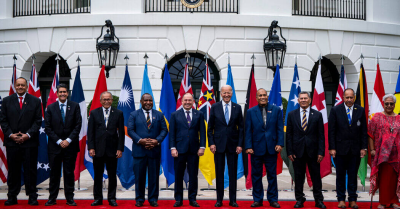纽约时报中文网 - 英文原版-英Biden Hosts Pacific Islands With a Rising China in Mind
September 25, 2023 5 min 893 words
这篇报道反映了拜登政府在应对不断崛起的中国时,与太平洋岛国的外交举措。这一举动表明美国越来越重视太平洋地区的地缘政治战略,并试图在这个关键时刻与岛国建立更牢固的合作关系。然而,我们必须审慎看待这种外交动作的动机,是否真正出于对岛国的关切,或者更多地是基于地缘政治的自身利益考量。重要的是,美国在应对中国崛起时需要坚持合作与竞争并存的原则,确保这一举措不会导致紧张局势升级,而是为地区和平与繁荣做出积极贡献。与太平洋岛国的密切合作可以为地区稳定和发展提供有益的支持,但务必保持透明度和坦诚,以建立真正互惠互利的伙伴关系。
The Pacific Island state of Niue is one of the world’s tiniest. Covering just over 100 square miles and with a population of about 1,700, it has no military, is not a member of the United Nations and was not recognized as a sovereign nation by the United States until last year.
But President Biden was talking about Niue on Monday at the White House, when he hosted the leaders of 18 Pacific Island nations, the second gathering of its kind in a year and the latest illustration of a regional competition for influence between the United States and China.
Among Mr. Biden’s announcements at the event was that the United States would, for the first time, establish formal diplomatic relations with Niue and the Cook Islands, a nearby haven for snorkelers.
Speaking to the leaders at the White House on Monday, Mr. Biden invoked America’s World War II campaign against Japan in the region, and, without naming China, implied that another kind of battle was now underway.
“Like our forebears during World War II, we know that a great deal of the history of the world will be written across the Pacific over the coming years,” Mr. Biden said. “And like them, we owe it to the next generation to write that story together.” Officials said Mr. Biden spent more than two and a half hours with the group.
Mr. Biden’s second U.S.-Pacific Islands Forum Summit, as the White House calls the event, is part of a larger Biden administration effort to deepen ties with a string of islands in the South Pacific, where officials say Beijing hopes to project military power.
The event, reprising one from last September, was mainly designed to strengthen and spotlight ties after what officials concede were years of bipartisan neglect. But Mr. Biden also announced that he was working with Congress to invest $40 million in infrastructure spending for the islands, among other initiatives.
Those announcements hardly amount to a seismic diplomatic event. But they are two of many recent moves the Biden administration has made to strengthen America’s presence in a region east and northeast of Australia.
Over the past year, the United States has opened embassies in the Solomon Islands and Tonga, and plans to open one early next year in Vanuatu. When Secretary of State Antony J. Blinken landed in Fiji in February 2022, it was the first visit there by an American secretary of state in 36 years.
Mr. Biden had hoped to become the first sitting American president to visit a Pacific Island nation but was forced to cancel a trip to Papua New Guinea in May because of the federal debt ceiling crisis.
Those steps are in no small part chess moves in response to growing Chinese influence in the region, which became particularly vivid last year when the Solomon Islands surprised U.S. officials by signing a sweeping security pact with Beijing, in what analysts say could eventually allow for a permanent Chinese military presence.
Biden administration officials say their goal is not specifically to compete with China, or to ask countries to choose between Washington and Beijing, but to help ensure a “free and open” Pacific that is peaceful and hospitable to commercial shipping. But they acknowledge that China’s assertiveness has forced them to pay increased attention to the region.
And China’s state-controlled media has derided U.S. efforts to gain influence as part of an obvious power struggle. An editorial on Monday in Beijing’s China Daily newspaper said the Pacific island countries had been “largely forgotten by the West” until recently, “when the United States and its allies started viewing China as a rival.”
“All of a sudden, the region has become an area of interest on their geopolitical chessboard,” the newspaper said.
The White House event on Monday was part of an elaborate multiday program that included a trip on Sunday to a Baltimore Ravens professional football game, and to a U.S. Coast Guard cutter in Baltimore Harbor, for a briefing by the Coast Guard commandant on maritime issues. Those issues include the growing problem of illegal fishing off the nations’ shores, for which China is primarily responsible.
Mr. Blinken was also scheduled to host the leaders at a State Department dinner on Monday night. They were set to join a business round table on Tuesday with Treasury Secretary Janet L. Yellen and to meet with Mr. Biden’s special envoy for climate, John Kerry.
Biden officials say that the climate is the premier issue for the leaders, whose countries risk being submerged by rising sea levels. But they are also eager for other forms of U.S. assistance, including a greater Peace Corps presence and undersea cables to increase internet access on the islands.
To the frustration of the Biden administration, one key leader was notably absent from this week’s gathering: Manasseh Sogavare, the prime minister of the Solomon Islands, whose close relationship with Beijing has elicited concern in Washington.
Despite his presence in New York last week for the United Nations General Assembly, Mr. Sogavare did not come to Washington this week.

